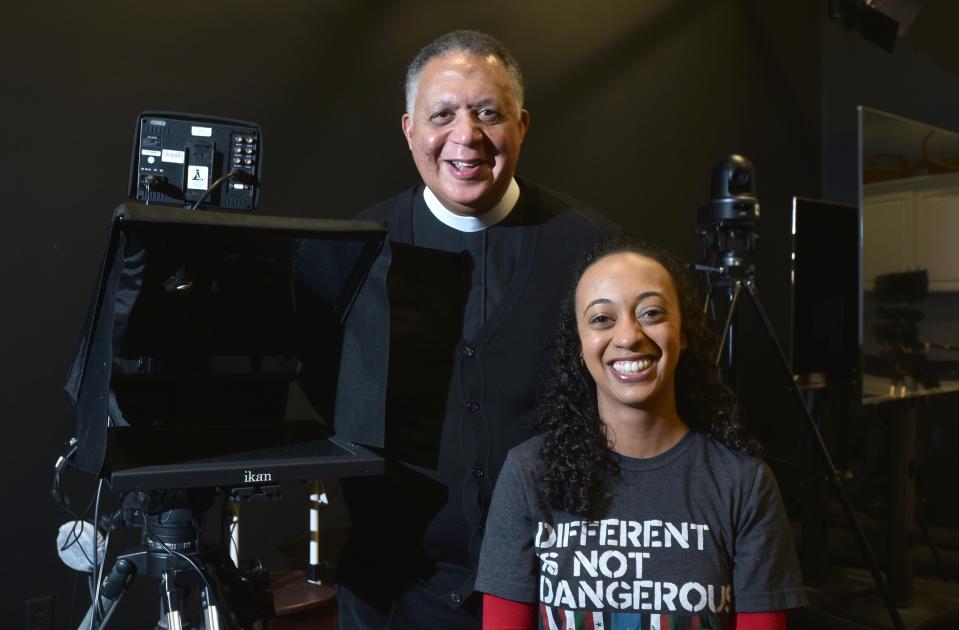Talking about race: FCTV's 'THE Conversation' focuses on difficult topic for many
Racism is something you ordinarily don’t talk about at the dinner table, said Onjalé Scott Price, a Falmouth Select Board member who works on diversity and inclusion in STEM.
“Talking about race is often seen as taboo. ... I want to change that, I want people to have open conversations, because that’s the only way that we’re going to make any progress on these issues,” Scott Price said.
To that end, Scott Price and the Rev. Will Mebane, rector of St. Barnabas's Episcopal Church in Falmouth, co-host a public access television show on FCTV called "THE Conversation," which explores the impacts of racism in fields like sports, affordable housing and criminal justice, to name a few.

THE Conversation first aired in August 2020 during the “reckoning” following the murder of George Floyd in police custody, Mebane said.
Debra Rogers, who is CEO of FCTV, reached out to Mebane to ask if he would be willing to host a show that discussed racial issues. He in turn contacted Scott Price to act as co-host.
According to Scott Price, Rogers initially had the idea to produce the show after a public commenter at a Select Board meeting declared “there is no racism in Falmouth.”
THE Conversation looks at a specific topic each episode and explores the ways in which race affects it. Most recently, the show aired its 16th episode, centering on racism in sports. The hosts, as well as nationally known guests Richard Lapchick, Jen Fryand Colleen Coyne, identified the ways in which racism affects athletics, and suggested ways to combat and hopefully eliminate it.
The next episode of THE Conversation will air Feb. 11 on FCTV.org. All past episodes are also available on the website and on YouTube.
Keeping the attention on problems of racism
Even though the show was conceived in the wake of the killing of Floyd, Mebane said he is hopeful it serves to talk about racism even when there isn’t a high-profile incident in the media.
He said that when there is an incident such as the shooting of an unarmed black person, or a holiday like Martin Luther King Jr. Day, the nation’s attention will turn to problems of race or racism. However, that attention is often fleeting, he said.
“THE Conversation is a monthly opportunity for us to keep the issue of racism in the public’s eye, so that these issues aren’t forgotten when the headlines are no longer pointing to some act of racism in the country,” Mebane said.
Part of the challenge with talking about racism, especially on the Cape, is the lack of diversity.
Many of the people who live on the Cape live in a bubble, Mebane said. He said that Cape Codders sometimes brag about “not going over the bridge,” but that only serves to further perpetuate the bubble, he said.
According to 2021 U.S. Census Bureau data, about 92% of Barnstable County is white.
Because of the lack of diversity within that bubble, many people on the Cape don’t have the opportunity to engage with people of color, which means they don’t have to concern themselves with issues that affect people of color, Mebane said.
2020 Census results: Cape and Islands population grew in number and diversity
Besides the show, Mebane and Scott Price work on issues of social justice within their respective professions.
Scott Price is co-director of the Woods Hole Partnership Education Program, which is an internship program in marine and environmental science for students from under-represented backgrounds. She is also the chief operating officer of Mizar Imaging in Woods Hole, a company that designs and manufactures scientific equipment and prioritizes diversity and inclusion when recruiting interns.
First Black rector at St. Barnabas'
Mebane uses his position as rector at St. Barnabas' Episcopal Church to talk about race. In fact, he is the first Black rector at the church. When he first arrived, multiple people told him they were happy he was here.
When he asked why they were happy, their response was startling and frank.
He summarized what they said to him:
“People here in Massachusetts, people here on the Cape, people here in Falmouth, 98% or better of whom are white, think they get it. They think they understand white privilege, they understand the challenges of being a person of color in this country, and they don’t have a clue.”
The parishioners wanted a Black rector to help wake them up.
However, it hasn’t always been rainbows and sunshine.
Some people criticized Mebane for focusing too much on race, others stopped giving money to the church, and some left the church simply because they didn’t want a Black rector, he said.
Memorable experience from the Indigenous people episode
Even though Mebane and Scott Price are often knee-deep in racial issues, THE Conversation has served to teach even these experienced activists.
When asked about their most memorable experience on the show, both hosts replied with the same moment.
22 in '22: Challenges facing Cape Cod in new year, strategies for success
In November 2020, the hosts decided to bring Indigenous guests on the show to talk about racism and Thanksgiving, among other topics.
During the show, Talia Landry of the Mashpee Wampanoag Tribe, said that people needed to ask for Native perspectives all year-round, not just during times like Thanksgiving and Columbus Day.
“I did the thing that I hate that people do to me during Black History Month," Scott Price said. It's the "idea that, oh, it’s Black History Month, so now let's talk about Black people and their issues, instead of talking about these issues year-round.”
This article originally appeared on Cape Cod Times: FCTV 'THE Conversation' talks about racism Cape Cod monthly program

